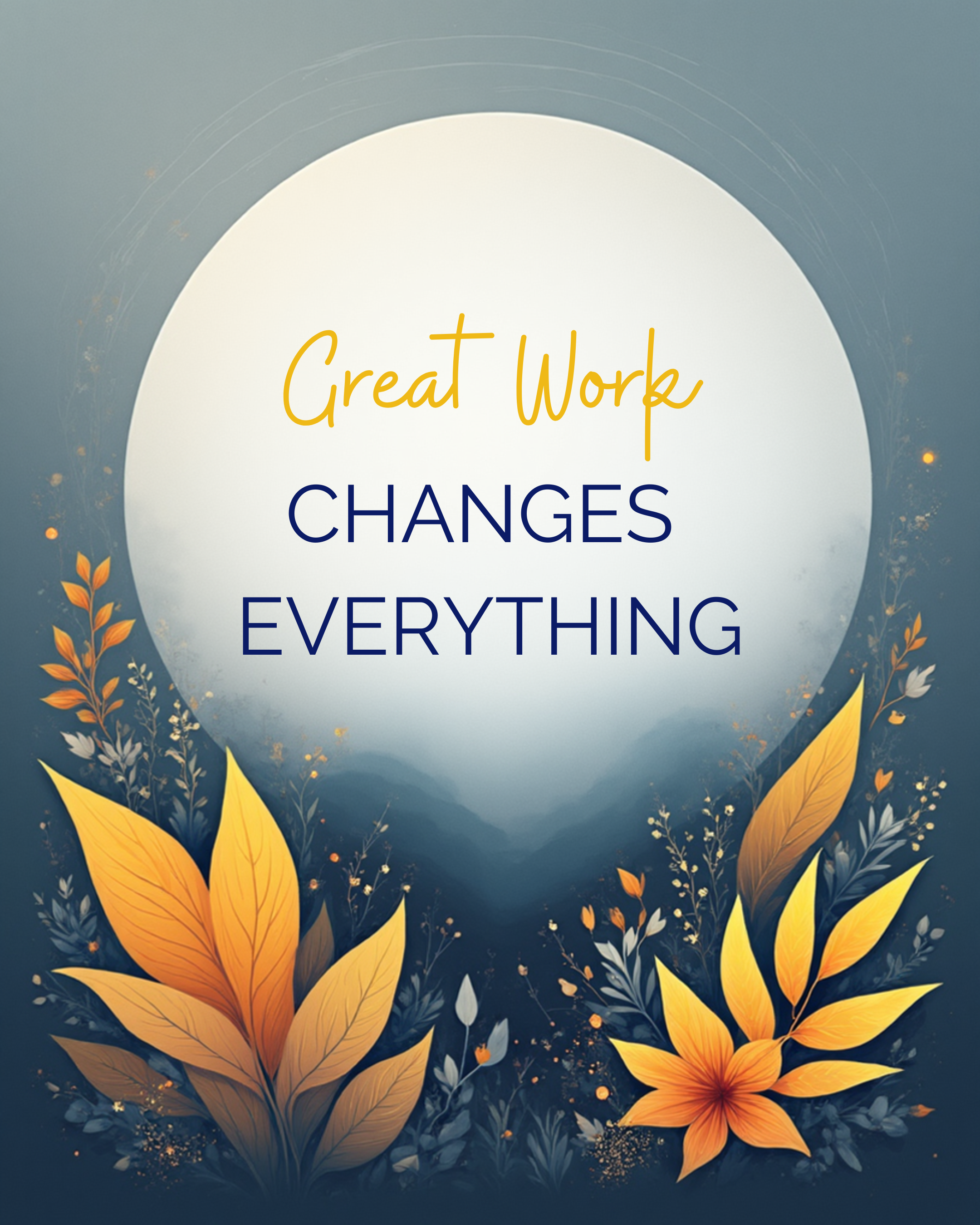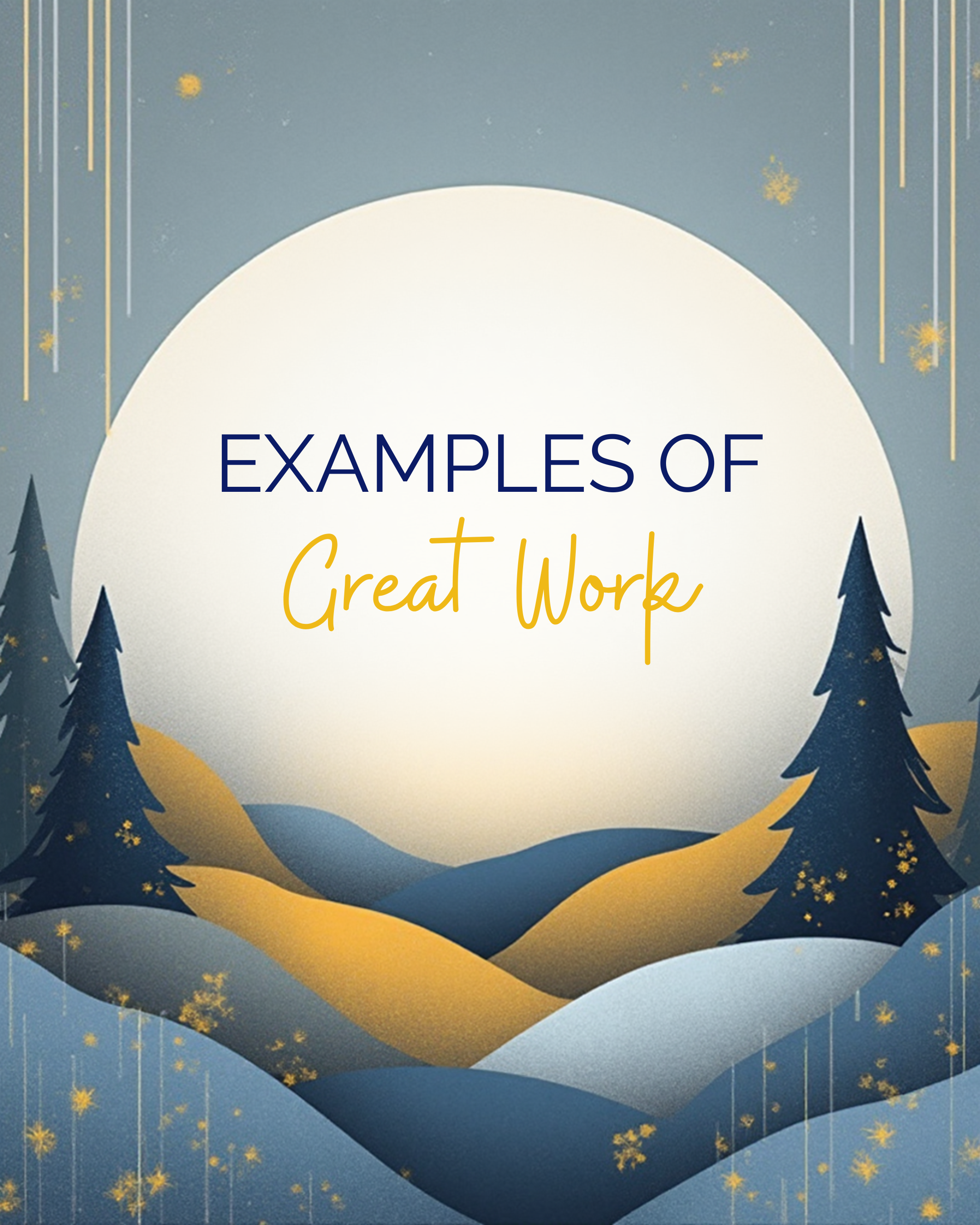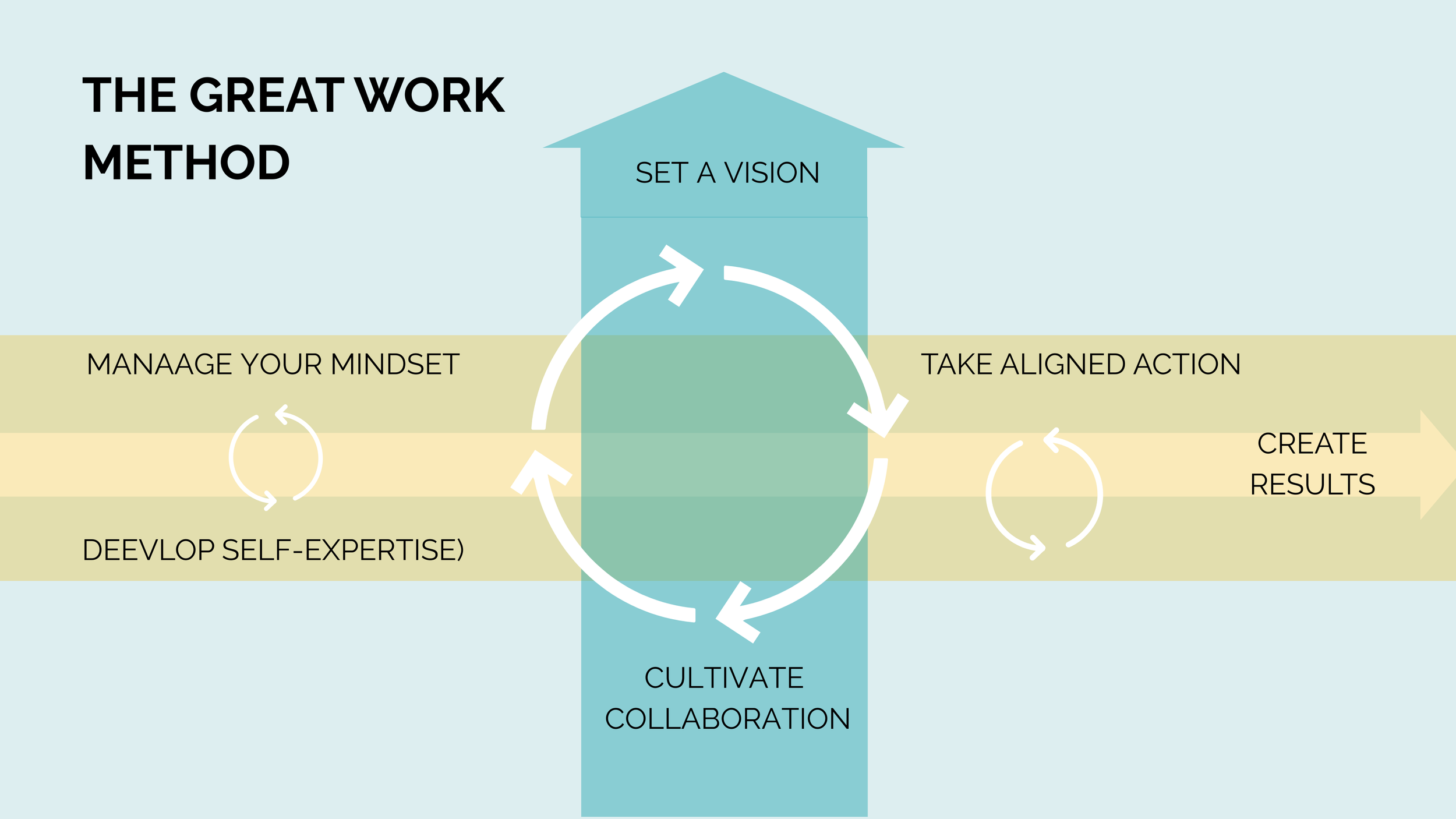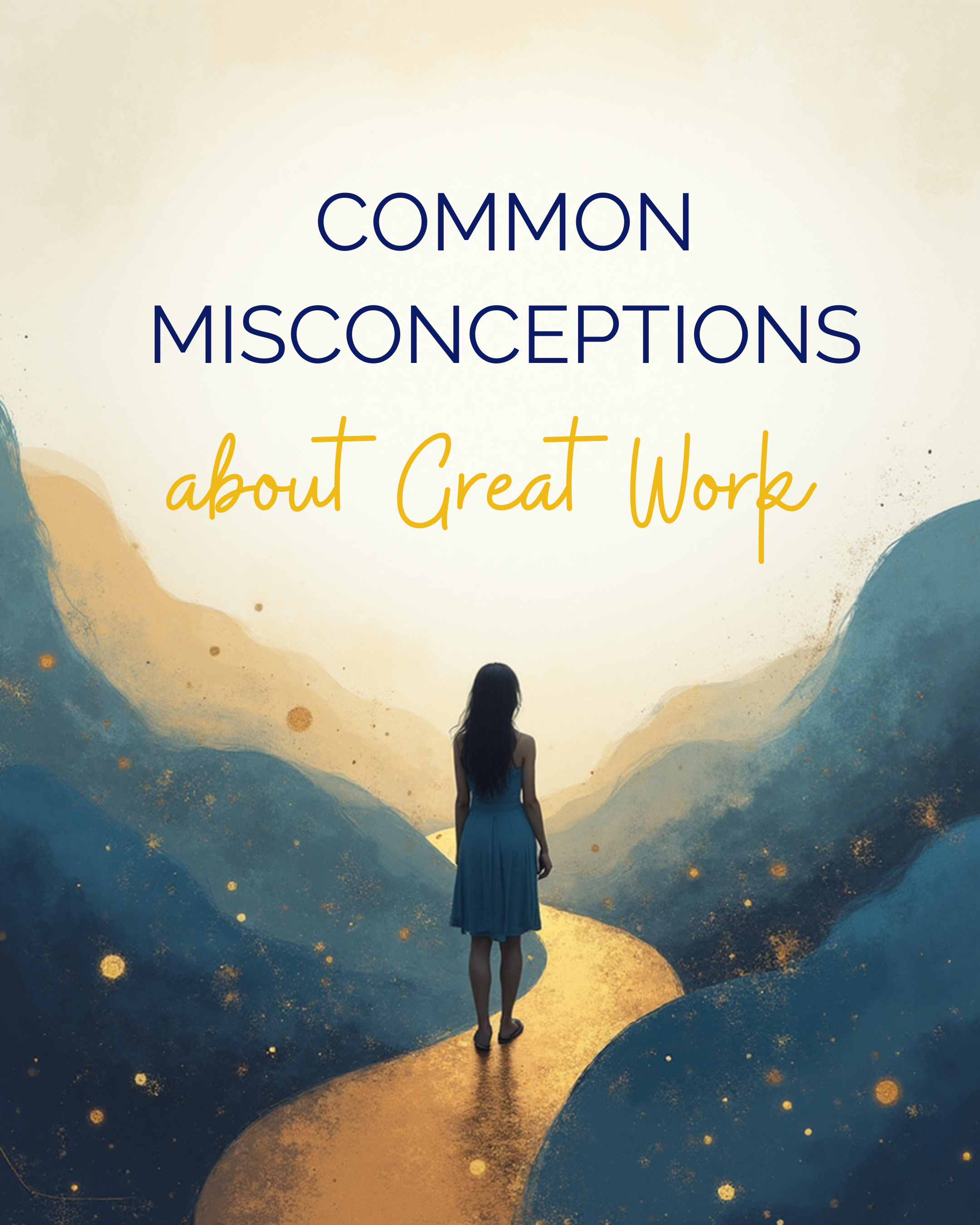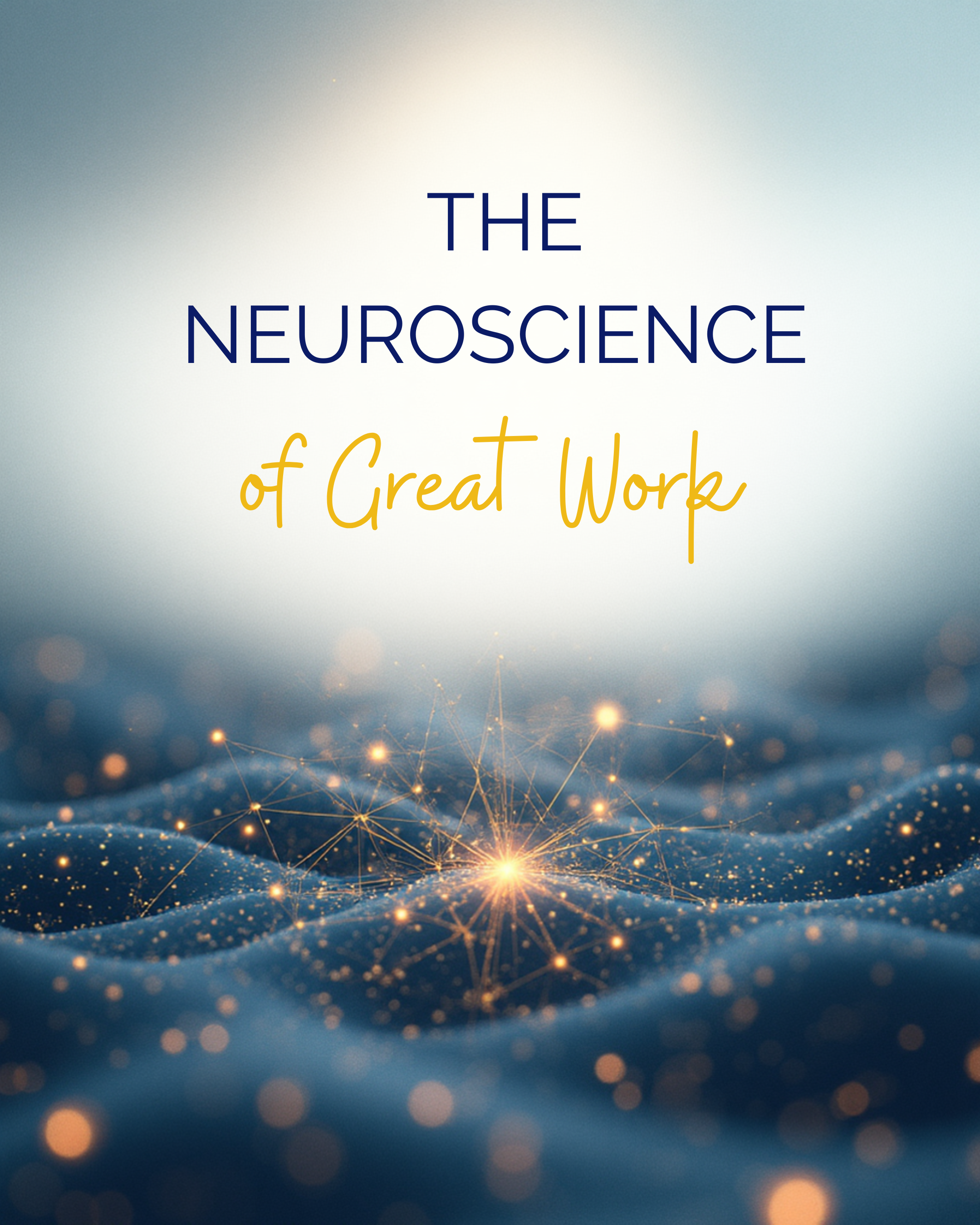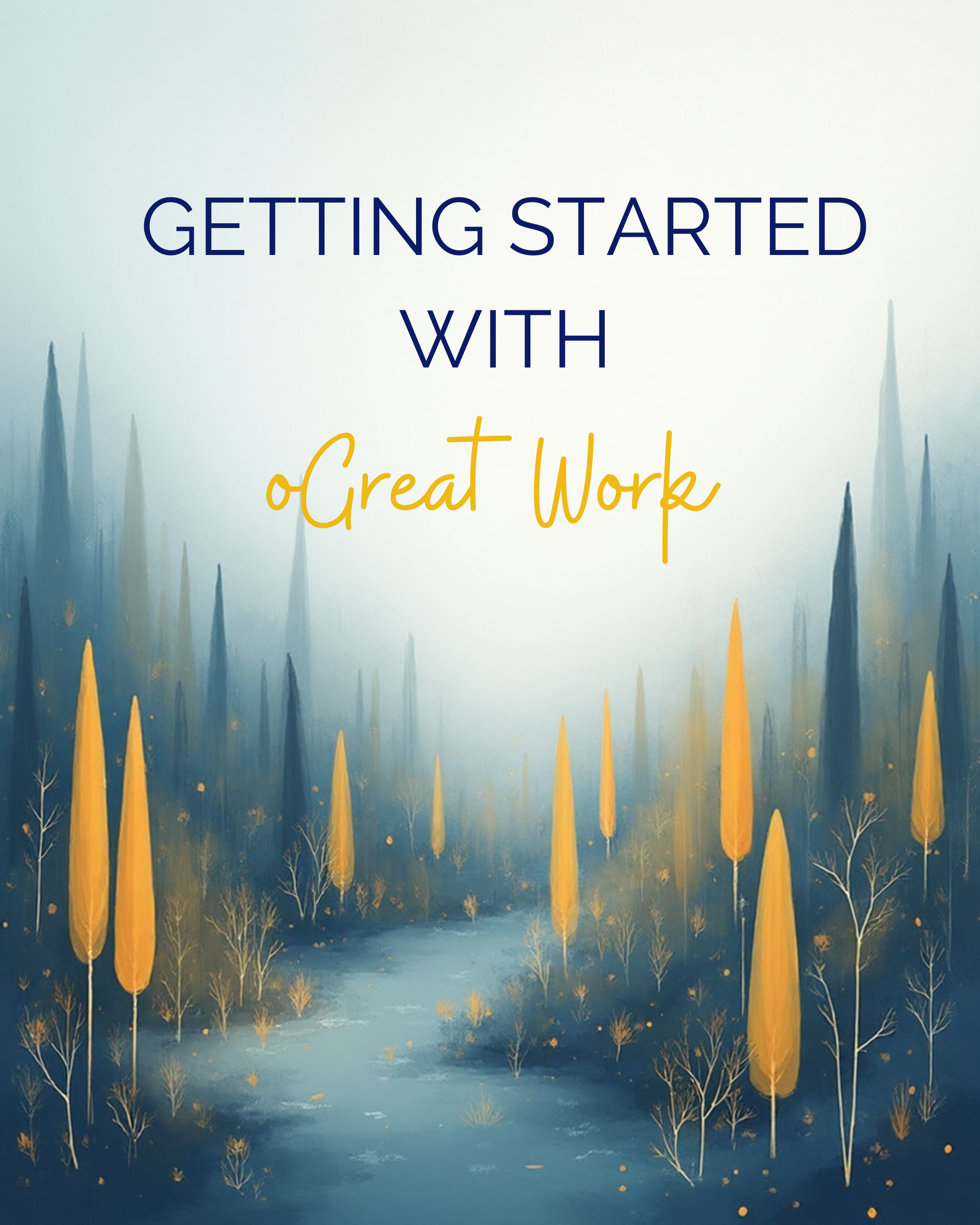
Great Work is the meaningful, energizing work that feels like it is calling to you. It makes you feel more alive, helps you grow in healthy ways, and gives you a natural edge, because genuine interest fuels stronger ideas, deeper focus, and better outcomes.
Great Work honors your humanity rather than draining your energy. It strengthens your relationships instead of overwhelming them, and helps you stay connected to what matters most.
Great Work is not limited to job titles or impressive achievements. It is often more personal and less visible than people expect. It may be the writing that wants to be written, the business that keeps tugging at you, the community project that will not leave you alone, or the healing work you feel called to pursue. Great Work is the work you return to again and again because it feels meaningful, important, and full of possibility.
If you have been searching for purpose or a more sustainable way to approach your work, Great Work offers a grounded, research-supported path that centers how humans actually think, work, and grow.
Why Great Work Matters
Great Work changes how you experience your work and your life. It strengthens your sense of meaning and helps you feel more connected to who you are and what you care about. Many people describe a feeling of alignment and renewed energy when they begin pursuing the work that matters most to them. Here are some of the most common ways Great Work transforms your experience.
Great Work increases fulfillment.
When you engage with meaningful work, your energy grows. You feel more focused, more capable, and more satisfied with your daily life. You feel the difference between simply getting through your tasks and feeling genuinely connected to your purpose-driven work.
Great Work gives you a competitive advantage.
Your Great Work gives you a competitive advantage because genuine interest fuels deeper knowledge and stronger performance. People who are engaged in their work tend to advance more quickly and earn more over time.
Great Work supports creativity and innovation.
Once you shift your attention toward the work that matters most, your creativity becomes easier to access. You have more ideas, and you trust those ideas more. This is one reason Great Work leads to breakthroughs across industries.
Great Work improves professional impact.
People who engage with their Great Work often become clearer communicators, stronger leaders, and more thoughtful collaborators. Their work has greater depth and focus, and opportunities tend to expand around them.
Great Work strengthens resilience.
When you care about your work in a meaningful way, it becomes easier to stay engaged during challenges. You learn through experimentation, you adapt quickly, and you develop a stronger sense of self-trust.
Great Work enhances well-being.
Dr. Crowell teaches that Great Work flows more easily when you are healthy and supported, and the more you engage with Great Work, the more your well-being grows. You begin making decisions that honor your energy and your needs.
Great Work creates sustainable momentum.
Instead of pushing through cycles of exhaustion and avoidance, people doing their Great Work develop a more grounded rhythm. They focus on what truly matters, they let go of what does not, and they experience greater momentum by doing less but doing it with intention.
Great Work matters because it transforms your relationship to your work, your time, your creativity, and your identity.
Examples of Great Work
Great Work looks separate for each person. It is shaped by meaning and alignment. Here are real-world examples of how Great Work comes to life in many fields and pursuits.
-
After years of practicing law, an attorney realizes he wants to reconnect with the reason he entered the field. He protects time each week to take on pro bono cases that align with his values.
His Great Work shows that sometimes the meaningful path is a return to the work that first felt purposeful.
-
A coach who has been working one-on-one feels called to reach more people and write her book. She shifts her practice to a group model, which gives her space to pursue her creative work.
Her Great Work is building a community where people learn and grow together while creating a life that supports her own needs
-
A photographer becomes fascinated with astrology as a tool for helping creatives understand their direction. She brings the two disciplines together in her portrait sessions, using conversation and imagery to help people express who they are becoming. Her Great Work is helping people see their strengths reflected back to them with clarity and confidence.
-
A psychologist notices that the work that feels most meaningful is not publishing more papers, but mentoring students, supporting his family, and helping others think differently about development. He chooses to center these everyday contributions instead of the pressure to achieve more.
His Great Work is creating impact through presence, care, and thoughtful ideas.
-
An accountant felt called to write a book, but she did not want to give up the stability of her full time job. She built a gentle routine and wrote in steady weekly sessions until her manuscript grew and her voice strengthened.
Her Great Work was making room for her creativity while honoring the career that sustained her life.
-
A government employee is waiting for her student loans to be cleared through PSLF, a process that takes years. During that long stretch of time, she began creating detailed cosplay costumes after work. She found the projects brought energy, joy, and connection.
Her Great Work was giving her creativity space while she stayed committed to her financial goals.
These stories, along with many others, are told in Great Work.
A FRAMEWORK FOR GREAT WORK
The Great Work Method
Great Work is not a mystery or a lightning bolt. It grows through a set of practices that help you stay aligned, energized, and connected to the work that matters most. The Great Work Method brings those practices together into a simple, research supported framework that helps your meaningful ideas move forward in a sustainable way.
Below is a visual overview of the five core elements that support Great Work.
This diagram shows how your inner alignment (mindset and self expertise) creates the foundation for steady progress, while your outer alignment (aligned action and collaboration) helps your ideas move into the world. Vision sits at the top because it is the direction that pulls everything forward.
Here are the five elements in more detail.
Vision
Vision is the idea or direction that draws you forward. It feels energizing and meaningful, like something that wants your attention. Vision does not need to be polished or grand. It simply needs to feel alive enough to pull you toward the version of yourself you are becoming.
Mindset
Mindset is your ability to work with your thoughts, expectations, and emotional patterns so you can remain grounded, courageous, and open as your Great Work evolves. A steady mindset creates space for experimentation and reduces the pressure to get everything right immediately.
Self-Expertise
Self-expertise means understanding how you work best. This includes your strengths, rhythms, preferences, and needs. When you honor what supports you, you create a sustainable path for your Great Work instead of forcing yourself into systems that drain your energy.
Collaboration
Collaboration connects your Great Work to the people who can understand it, support it, and help it move beyond you.
Aligned Action
Aligned action is the practice of choosing what matters right now and taking small, meaningful steps forward. It focuses on steady progress without urgency, pressure, or overwhelm. A core part of aligned action is learning to do less so you can make room for the work that moves your Great Work forward.
To support this practice, the Upside Down Triangle of Ideas helps you translate big, energizing ideas into simple steps you can take today.

Finding your Great Work is a process of curiosity, attention, and small experiments. It rarely arrives fully formed. Instead, it reveals itself through patterns, insights, and the moments that feel most alive to you. Here are some of the clearest signals to look for.
Notice what excites you
Pay attention to the ideas that feel energizing when you think about them. These are the projects that spark imagination and bring you alive, even before anything exists on paper.
Pay attention to moments of envy
Envy and jealousy often signal desire. When you see someone doing something you wish you were doing, it can point toward your own Great Work.
Listen to the feedback others give you
People notice your strengths long before you do. When someone reflects that your perspective is unique or that you are particularly good at something, it can be a clue about what wants to grow in your work.
Consider what you would regret never doing
Meaningful projects often carry a sense of quiet urgency. Even if you have postponed them for years, you still think about them. Regret is a powerful pointer toward Great Work.
Honor your values
Your Great Work is deeply connected to what you care about. Notice the values that guide your decisions, inspire your curiosity, or make you feel most like yourself.
Experiment with the ideas that call to you
Clarity grows through action. Begin with one small step, even if you are unsure. The simplest experiments help you understand what energizes you and what feels misaligned.
Great Work becomes clearer as you try things, observe what feels right, and allow yourself to evolve.
Supporting Tools
In Dr. Crowell’s courses and books, exercises such as The Lifetime Achievement Award, The Mirror, and The Fulfillment Audit help people recognize patterns, name their desires, and bring purpose-driven work into focus.
Great Work strengthens as you take small steps. It becomes part of your identity as you learn to trust yourself.
If you are still finding your way, this free course can help you explore your ideas and discover what feels meaningful. You can begin anytime.
CLUES TO HELP YOU FIND YOUR GREAT WORK
How To Identify Your Great Work
Common Misconceptions About Great Work
People often misunderstand what Great Work actually is, which can make it hard to recognize their own. These clarifications can help you see the idea more clearly.
-
Great Work is measured by meaning and alignment rather than scale. Some Great Work becomes public, and some is deeply personal.
-
You do not need to leave your job to do your Great Work. Many people grow it inside the career and life they already have.
-
You do not need clarity before you begin. Clarity grows through action, experimentation, and paying attention to what feels alive.
-
Great Work thrives in connection. Supportive relationships help your ideas grow, expand, and take shape.
-
You do not need a polished roadmap. Your next steps reveal themselves as you explore what matters.
These misunderstandings are common. Great Work becomes clearer as you begin, explore, and stay open to what draws your attention.
The Neuroscience of Great Work
Great Work is supported by the science of how the brain changes. Neuroplasticity allows your brain to reorganize itself through repetition and focused attention. Each time you engage with meaningful work, you strengthen the pathways that make that work easier, more natural, and more energizing over time.
Choosing Great Work shapes your neural patterns
When you focus on ideas that matter to you, your brain increases activity in networks related to learning, motivation, and creative problem solving. This makes it easier to return to those ideas and explore them more deeply.
Aligned action creates supportive habits
Consistent, small steps signal to your brain that this work is important. Over time, these steps become habits that reduce resistance and increase momentum.
Small steps build lasting change
Incremental progress activates your reward system. These small wins reinforce your commitment and strengthen your confidence as your Great Work evolves.
Alongside neuroplasticity, your brain is also shaped by patterns that influence how you approach meaningful work. One of the most common is the negativity bias, which tends to scan for risks before possibilities. This can create hesitation or self-doubt when you consider starting something new. It is simply your brain responding to uncertainty.
Gratitude is one practice that helps balance this tendency by widening attention and increasing cognitive flexibility. It increases activity in brain areas associated with creativity, motivation, and well-being. Gratitude supports resilience, widens your perspective, and helps you stay open to new ideas as you move toward your Great Work.
Beginning your Great Work does not require a major life overhaul. You can start with something small and pay attention to what feels energizing.
Try one of these small steps
Reflect on the ideas that bring you energy
Explore a project you have been thinking about
Say no to one obligation that drains you
Say yes to an opportunity that excites you
Start a tiny practice of daily intention
Experiment with something that feels interesting
You can also use tools like the Great Work Journal, the free resources on this site, and the Unleashing Your Great Work materials to stay inspired as you explore.
Your Great Work is already waiting for you to begin.
SIMPLE WAYS TO BEGIN
Getting Started With Your Great Work
Frequently Asked Questions
-
Great Work is the meaningful, purpose-driven work that aligns with your values, strengths, and sense of contribution. It can look like writing a book, building a business, creating art, supporting others, or exploring a new idea. Great Work is the work that matters most to you and strengthens your connection to your purpose.
-
Your Great Work often reveals itself through recurring interest. You think about it in quiet moments, you feel energized when you talk about it, and you wish you had more time for it. It usually lives where your curiosity, strengths, and desire for impact meet.
-
Great Work has fewer external expectations than other responsibilities. Tasks with deadlines rise to the top, while meaningful work that depends on self-driven intention gets postponed. When schedules get full, familiar routines take over. Simple structures and small steps help keep your Great Work present.
-
Great Work is defined by meaning and alignment. Regular work keeps life moving, and hobbies bring enjoyment. Great Work connects your abilities with your purpose. It reflects what you care about and the difference you want to make.
-
Yes. Many people pursue Great Work while working full-time. Your job can offer stability while your Great Work grows in steady and sustainable ways.
-
Procrastination on meaningful work often reflects uncertainty or pressure. You can reduce this by breaking your work into approachable steps, creating supportive routines, and allowing yourself to experiment. When the process feels manageable, momentum grows naturally.
-
Timelines vary. Some projects take months, while others unfold over years. The most helpful approach is steady progress rather than rushing toward completion. The ninety day goal system makes large visions feel achievable.escription
-
Having several meaningful ideas is common. You do not need to choose one forever, but it does help to choose one for now. Choose one to focus on now. Select the idea that feels the most alive or easiest to begin. You can return to your other ideas later.
-
You create time for Great Work by clarifying priorities and adjusting commitments. This may include releasing obligations that take energy without contributing to your goals. Even short pockets of aligned time can create meaningful progress.
-
Great Work can help restore motivation because it reconnects you with what feels meaningful. If you feel depleted, begin with rest and gradual support. Once you regain steadiness, you can reintroduce small steps toward your Great Work.
-
Yes. Your Great Work evolves as you grow. You may complete one meaningful project and discover a new direction. This evolution reflects your development and shifting priorities.
-
Great Work can be creative, but creativity is not required. It can take the form of teaching, research, leadership, caregiving, entrepreneurship, or scientific work. The defining qualities are meaning and alignment.
-
Great Work takes many forms. Some of the most meaningful work happens in daily life and in connection with others. The scale of a project does not determine its value.
-
Great Work includes moments of inspiration, and it also includes phases that require patience or learning. What remains consistent is the sense that the work is worthwhile.
-
Relationships often help Great Work grow. Support, collaboration, and shared insight build confidence and expand possibilities. Many people discover that their best ideas flourish in community.
-
The brain gives more attention to tasks that feel urgent or familiar. This can make meaningful work harder to prioritize at first. Through repetition and supportive routines, your brain begins to associate Great Work with focus and curiosity, which makes it easier to return to the work.
-
Gratitude increases activity in brain regions connected to creativity and openness. When you practice gratitude, you create emotional states that help you stay connected to possibility rather than urgency. This supports both resilience and motivation in your Great Work.
-
Consistency grows through gentle structure. Weekly focuses, daily intentions, and supportive environments help you stay engaged. Community support also strengthens follow-through.
-
Fear often appears around meaningful work. You can acknowledge the feeling and begin gently. Small steps build confidence. Each action helps you learn more about yourself and your work.
-
Yes. When you pursue meaningful work, clarity and purpose become visible to others. Collaborators, mentors, and aligned opportunities often emerge. Great Work naturally expands your network and widens your path.
Still have questions? Contact us.


